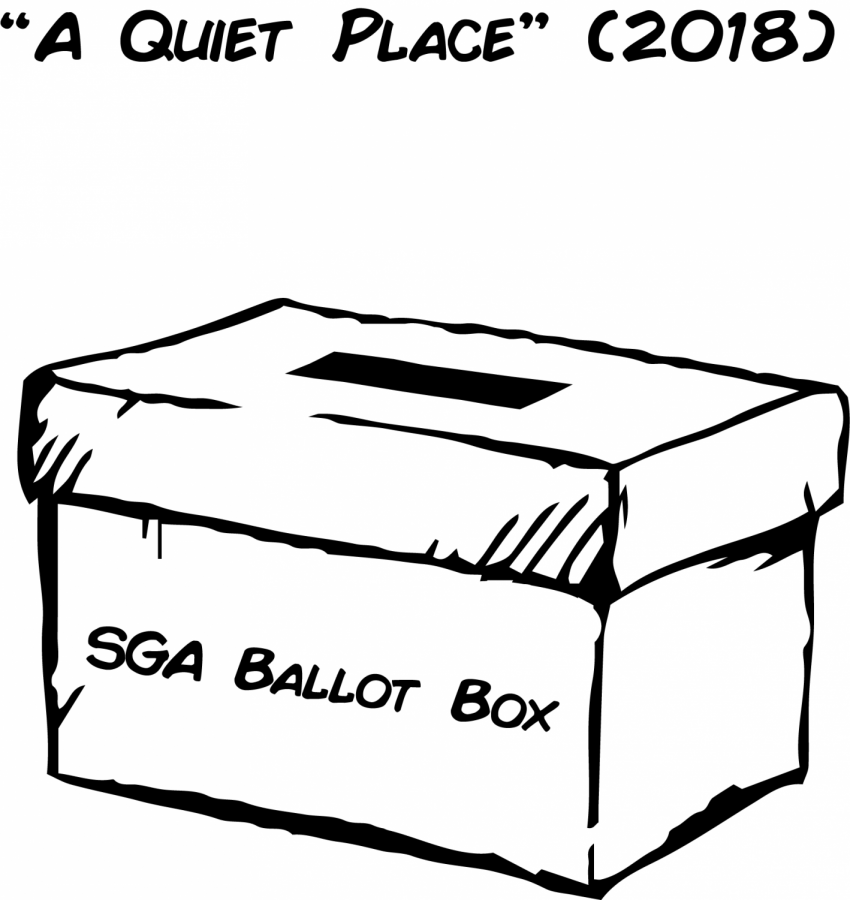Personal attacks and secretive meetings have no place in student government
April 23, 2018
The Issue: The election for the Student Government Association’s newest student body president concluded early Wednesday morning, as Stephen Mayer received 35 percent of the votes, earning him the title of SGA president-elect. Garrett Edmonds and Harper Anderson, who were elected executive vice president and administrative vice president, respectively, also campaigned on Mayer’s ticket even after being temporarily disqualified for the use of a meme in one of their chalk campaigns on campus.
Our Stance: SGA has turned into a circus and the students who actually care enough to pay attention to what goes on in our student government should be ashamed of what has taken place just this past month. Whether it’s an SGA senator, who was not re-elected to any position this past election, referring to the entire LGBT community on campus as “wicked” or the Judicial Council holding a meeting in the middle of an election to practically eliminate two-thirds of the competition, it’s no wonder such a low percentage of the student body has participated in SGA elections in the past.
Pepe the Frog, an image that once held little importance in the minds of WKU students, could have played a major role in determining the outcome of an SGA presidential election. The MEA ticket, which at one point was not allowed to win the election at all, should be thanking the outrage caused by a meme for their two percent victory margin.
Should MEA have been disqualified from campaigning in the election? No. The Pepe the Frog meme did not originate as a symbol advocating for white supremacy but was hijacked by alt-right groups during the 2016 U.S. Presidential election to further their own hate-driven agenda in support of current President Donald Trump.
While they should not have been disqualified from campaigning in the election, it is concerning that Edmonds was informed of the meme’s previous use by white supremacist groups, most notably last year at the white nationalist rally in Charlottesville, Virginia, and chose to do nothing about it when he could have simply asked those in charge of the task to draw something else.
It is important to note that, although it was classified as a hate symbol by the Anti-Defamation League in 2016, the MEA campaign did not use the meme in any context that might imply racist connotations. Simply labeling people as racist for using an image that other groups have twisted to further their own evil agenda just adds to the tension and distrust that has highlighted SGA this past year.
Furthermore, in light of the recent election controversy, the Herald Editorial Board found this to be an excellent opportunity to elaborate on what constitutes a letter to the editor and the purpose it is designed to serve. While a letter to the editor was published this past week by the Herald by an individual advocating for the Hounshell campaign, had we received a letter with fair points in favor of any other campaign, we would have published that as well.
These letters are designed to potentially give anyone who is passionate about an issue a platform to make their case for why other people should care about it too. Labeling an independent news publication as a fake news source with a political agenda is an insult to the long hours and hard work student journalists put in here to keep the public informed.
While the way SGA carried out their latest election was disappointing, perhaps it was enough evidence to show the public this particular institution of WKU needs to undergo some serious reconstruction. This latest incident should not be ignored because SGA does have the potential to do good for the students it represents. But personal attacks between senators and secretive meetings, albeit legal, that influence major elections will not give way to healthy change.






















